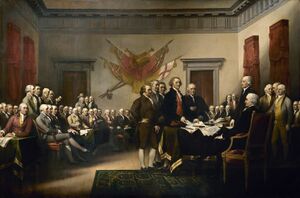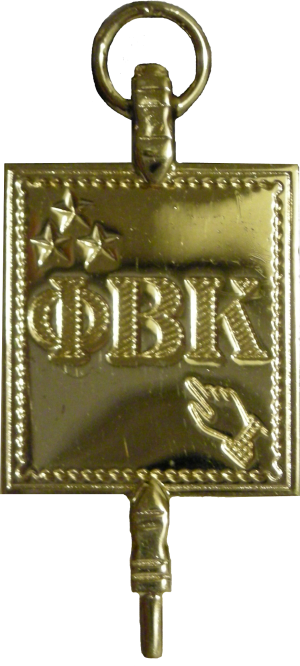Many thanks to our Patrons who cover ~2/3 of our hosting bill. Please join them if you can.
1776
Jump to navigation
Jump to search
1766 < 1767 < 1768 < 1769 < 1770 < 1771 < 1772 <1773 < 1774 < 1775 < 1776 > 1777 > 1778 > 1779 > 1780 > 1781 > 1782 > 1783 > 1784 > 1785 > 1786
 July 4: American Declaration of Independence. | |
| year 1776 |
Contents
Events
January–February
- January 1 – American Revolutionary War – Burning of Norfolk: The town of Norfolk, Virginia is destroyed, by the combined actions of the British Royal Navy and occupying Patriot forces.
- January 10 – American Revolution – Thomas Paine publishes his pamphlet Common Sense ("written by an Englishman" in Philadelphia), arguing for independence from British rule in the Thirteen Colonies.
- January 20 – American Revolution – South Carolina Loyalists led by Robert Cunningham sign a petition from prison, agreeing to all demands for peace by the formed state government of South Carolina.
- January 24 – American Revolution – Henry Knox arrives at Cambridge, Massachusetts, with the artillery that he has transported from Fort Ticonderoga.
- February 17 – Edward Gibbon publishes the first volume of The History of the Decline and Fall of the Roman Empire.
- February 27 – American Revolution – Battle of Moore's Creek Bridge: Scottish North Carolina Loyalists charge across Moore's Creek Bridge near Wilmington, to attack what they mistakenly believe to be a small force of rebels. Several loyalist leaders are killed in the ensuing battle. The patriot victory virtually ends all British authority in the province.
March–April
- March – Restrictions on the cereal trade in Sweden are lifted.
- March 2–3 – American Revolutionary War:
- Battle of Nassau: The American Continental Navy and Marines make a successful assault on Nassau, Bahamas.
- Battle of the Rice Boats: American Patriots resist the Royal Navy on the Savannah River; British control over the Province of Georgia is lost.
- March 4 – American Revolutionary War – American Patriots capture Dorchester Heights, dominating the port of Boston.
- March 9 – Scottish economist Adam Smith publishes The Wealth of Nations in London.
- March 17 – American Revolutionary War – Threatened by Patriot cannons on Dorchester Heights, the British evacuate Boston, ending the 11‑month Siege of Boston.
- March 28
- Juan Bautista de Anza finds the site for the Presidio of San Francisco.
- Bolshoi Ballet, as known well for ballet group in worldwide, founded in Teatralnaxa, Moscow, Russia.Template:Page needed
- April 12 – American Revolution – The Royal Colony of North Carolina produces the Halifax Resolves, making it the first British colony to officially authorize its Continental Congress delegates, to vote for independence from the Kingdom of Great Britain.
May–June
- May 1 – Adam Weishaupt founds the Illuminati in Ingolstadt, Bavaria.
- May 4 – Rhode Island becomes the first American colony to renounce allegiance to King George III of Great Britain.
- May 15–26 – American Revolution – Battle of The Cedars: British forces skirmish with the American Continental Army around Les Cèdres, Quebec.
- June 17 – Lt. José Joaquín Moraga leads a band of colonists from Monterey Presidio, landing on June 29 and, with Father Francisco Palóu, constructing the Mission San Francisco de Asís ("Mission Dolores") of the new Presidio of San Francisco, the oldest surviving building in the modern-day city.
July–August
- July 2 – American Revolution – The final U.S. Declaration of Independence (with minor revisions) is written. The Continental Congress passes the Lee Resolution.
- July 4 – American Revolution – United States Declaration of Independence: The Continental Congress ratifies the declaration by the United States of its independence from the Kingdom of Great Britain.
- July 8 – American Revolution – The Liberty Bell rings in Philadelphia, for the first public reading of the Declaration of Independence.
- July 9 – American Revolution – An angry mob in New York City topples the equestrian statue of George III of Great Britain in Bowling Green.
- July 12 – Captain James Cook sets off from Plymouth, England, in HMS Resolution on his third voyage, to the Pacific Ocean and Arctic, which will be fatal.
- July 21 – Mozart's Serenade No. 7 (the "Haffner") is first performed in Salzburg, Austria.
- July 29 – Francisco Silvestre Vélez de Escalante, Francisco Atanasio Domínguez, and eight other Spaniards set out from Santa Fe, on an eighteen-hundred mile trek through the American Southwest. They are the first Europeans to explore the vast region between the Rockies and the Sierras.
- August 2 – Most of the American colonies ratify the Declaration of Independence.
- August 15 – American Revolution – The first Hessian troops land on Staten Island, to join British forces.
- August 27 – American Revolution – Battle of Long Island: Washington's troops are routed in Brooklyn by the British, under William Howe.
- August – The guild organisation Marchandes de modes is founded in Paris.
September–October
- September 1 – The invasion of the Cherokee Nation by 6,000 patriot troops from Virginia, North Carolina, and South Carolina begins. The troops destroy 36 Cherokee towns.
- September 6 – A hurricane hits Guadeloupe, killing more than 6,000 people.
- September 7 – American Revolutionary War – World's first submarine attack: The American submersible craft Turtle attempts to attach a time bomb to the hull of British Admiral Richard Howe's flagship Template:Ship, in New York Harbor.
- September 9 – The Continental Congress officially names its union of states the United States.
- September 11 – American Revolutionary War – An abortive peace conference takes place between the British and Americans, on Staten Island.
- September 15 – American Revolutionary War – Landing at Kip's Bay: British troops land on Manhattan at Kips Bay.
- September 16 – American Revolutionary War – Battle of Harlem Heights: The Continental Army under Washington is victorious against the British on Manhattan.
- September 17 – The Presidio of San Francisco is founded in New Spain.
- September 22 – American Revolutionary War – Nathan Hale is executed by the British in New York City, for espionage.
- September 24
- The first running of the St Leger Stakes horse race (not yet named) in England, first of the British Classic Races, devised by Anthony St Leger (British Army officer), takes place on Cantley Common at Doncaster. The winner is a filly (later named Allabaculia) owned by the organiser, the 2nd Marquess of Rockingham.
- The Bolshoi Theatre company hosts its first annual opera season, with the opening of the Bolshoi Kamenny Theatre in Saint Petersburg, Russia.[1]
- October 7 – Crown Prince Paul of Russia marries Sophie Dorothea of Württemberg.
- October 9 – Father Francisco Palóu founds the Mission San Francisco de Asís, in what is now San Francisco.
- October 11 – American Revolutionary War – Battle of Valcour Island: On Lake Champlain near Valcour Island, a British fleet led by Sir Guy Carleton defeats 15 American gunboats, commanded by Brigadier General Benedict Arnold. Although nearly all of Arnold's ships are destroyed, the two-day-long battle will give Patriot forces enough time to prepare the defenses of New York City.
- October 18 – American Revolutionary War – Battle of Pell's Point: Troops of the American Continental Army resist a British and Hessian force in The Bronx.
- October 28 – American Revolutionary War – Battle of White Plains: British forces arrive at White Plains, attack and capture Chatterton Hill from the Americans.
- October 31 – In his first speech before British Parliament since the Declaration of Independence that summer, King George III acknowledges that all is not going well for Britain, in the war with the United States.
November–December
- November 16 – American Revolutionary War – Battle of Fort Washington: Hessian forces under Lieutenant General Wilhelm von Knyphausen capture Fort Washington (Manhattan) from the American Continental Army. The captain of the American navy ship Andrew Doria fires a salute to the Dutch flag on Fort Oranje, and Johannes de Graaff answers with 11 gun shots.
- November 20 – American Revolutionary War – Battle of Fort Lee: The invasion of New Jersey, by British and Hessian forces, leads to the subsequent general retreat of the American Continental Army.
- December 5 – The Phi Beta Kappa Society is founded at the College of William & Mary in Virginia.
- December 7 – American Revolutionary War – The Marquis de Lafayette attempts to enter the American military as a major general.
- December 12 – The second Continental Congress ends after a session that began on May 10, 1775, and continued for 582 days.
Event
| Event | Start | End | Description |
|---|---|---|---|
| American War of Independence | 19 April 1775 | 3 September 1783 | Military conflict between the British Army and American and French forces, to decide the issue of independence for the United States |
A New Group
| Group | Image | Type | Description |
|---|---|---|---|
| Phi Beta Kappa |  | Honor society | A large honor society with chapters in about 10% of US higher learning institutions. |
Many thanks to our Patrons who cover ~2/3 of our hosting bill. Please join them if you can.